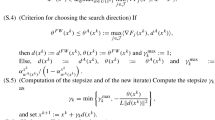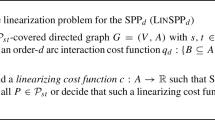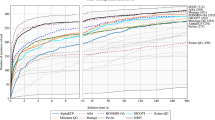Abstract
This paper provides a complete or partial characterization of the efficient set of a sezX \( \subseteq\) ℝm with respect tom objective functions {f i}, in terms of constrained optimization problems of the equality or inequality types, e.g., maximizef i (x) subject tox ∈X,f j (x) ≧α j , ∨j ‡i, α ∈ ℝm−1.
Related to these maximization problems are the lexicographic maximization problems, introduced since optimizations of the above kind do not always produce efficient solutions. With appropriate definitions of the lexicographic maximization problems, precisely the set of efficient solutions is obtained in the inequality form given above. The introduction of a special condition gives a related, but weaker, result for the equality constrained form. The introduction of efficient constraints also gives fairly strong characterization results.
Finally, the lexicographic optimization problem is reduced to a uniform linear optimization problem, and conditions for the special conditions required to strengthen the characterizations are also given.
Similar content being viewed by others
References
Yu, P. L.,Introduction to Domination Structures in Multicriteria Decision Problems, Multiple-Criteria Decision Making, Edited by J. L. Cochrane and M. Zeleny, University of South Carolina Press, Columbia, South Carolina, 1973.
Karlin, S.,Mathematical Methods and Theory in Games, Programming, and Economics, Addison-Wesley, Reading, Massachusetts, 1959.
Polak, E.,On the Approximation of solutions to Multiple-Criteria Decision-Making Problems, Multiple-Criteria Decision Making, Edited by M. Zeleny, Springer, Berlin, 1976.
Lin, J. G.,Proper Equality Constraints and Maximization of Index Vectors, Journal of Optimization Theory and Applications, Vol. 20, pp. 215–244, 1976.
White, D. J.,Optimality and Efficiency, John Wiley and Sons, Chichester, England, 1982.
Soland, R. M.,Multicriteria Optimization: A General Characterization of Efficient Solutions, Decision Sciences, Vol. 10, pp. 26–38, 1979.
Lin, J. G.,Proper Inequality Constraints and Maximization of Index Vectors, Journal of Optimization Theory and Applications, Vol. 21, pp. 504–521, 1977.
Mangasarian, O. L.,Nonlinear Programming, McGraw-Hill, New York, New York, 1969.
Kuhn, H. W., andTucker, A. W.,Nonlinear Programming. Proceedings of the Second Berkeley Symposium on Mathematical Statistics and Probability, Edited by J. Neymann, University of California Press, Berkeley, California, 1951.
Geoffrion, A. M.,Proper Efficiency and the Theory of Vector Maximization, Journal of Mathematical Analysis and Applications, Vol. 22, pp. 618–630, 1968.
Author information
Authors and Affiliations
Additional information
Communicated by P. L. Yu
Rights and permissions
About this article
Cite this article
White, D.J. Characterizations of efficient sets by constrained objectives. J Optim Theory Appl 45, 603–629 (1985). https://doi.org/10.1007/BF00939137
Issue Date:
DOI: https://doi.org/10.1007/BF00939137




